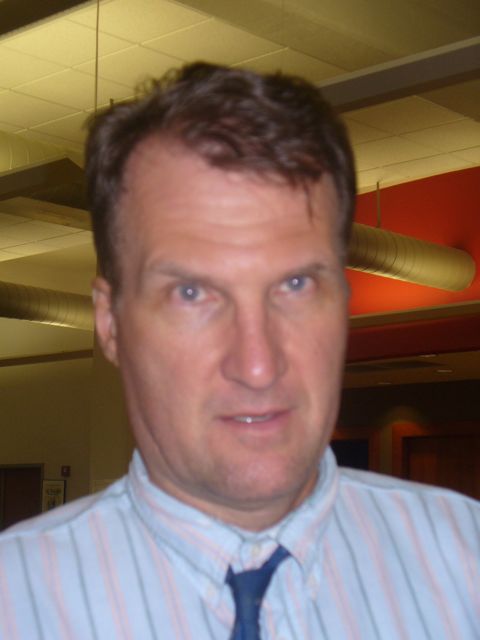
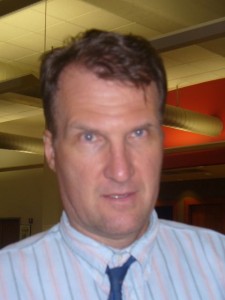 The editor hammers away at his typewriter, a worn fedora pulled low over one eye. He rolls his battered cigar from one side of his mouth to the other, completely absorbed in his work. The only people in the room besides him are the other four editors; slowly checking stories and making sure that they’re ready to be carried to the presses. Okay, so maybe my idea of a newspaper editor was a bit skewed. But I didn’t have anything to go by, so what was I to do? However, I am a lot more knowledgeable as to the ways of a newspaperman, thanks to my day with David Tulis. And just in case you haven’t been clued in by the last five sentences, he’s one of the editors at the Chattanooga Times Free Press, and a necessary part of the newspaper’s inner workings.
The editor hammers away at his typewriter, a worn fedora pulled low over one eye. He rolls his battered cigar from one side of his mouth to the other, completely absorbed in his work. The only people in the room besides him are the other four editors; slowly checking stories and making sure that they’re ready to be carried to the presses. Okay, so maybe my idea of a newspaper editor was a bit skewed. But I didn’t have anything to go by, so what was I to do? However, I am a lot more knowledgeable as to the ways of a newspaperman, thanks to my day with David Tulis. And just in case you haven’t been clued in by the last five sentences, he’s one of the editors at the Chattanooga Times Free Press, and a necessary part of the newspaper’s inner workings.
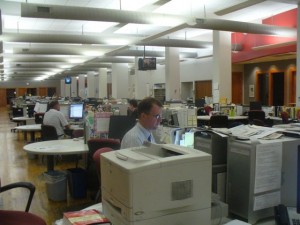 Mr. Tulis works on the second shift, so dad and I arrived at their headquarters around four in the afternoon. After the normal hellos and handshakes, he took me up to his floor and we got down to business. Far from my assumption of five men in a room, it was filled with about sixty or seventy people, all working on the next day’s paper. When I had taken the sights and sounds in, I was able to learn what Mr. David really does. His job actually divides into several parts:
Mr. Tulis works on the second shift, so dad and I arrived at their headquarters around four in the afternoon. After the normal hellos and handshakes, he took me up to his floor and we got down to business. Far from my assumption of five men in a room, it was filled with about sixty or seventy people, all working on the next day’s paper. When I had taken the sights and sounds in, I was able to learn what Mr. David really does. His job actually divides into several parts:
- setting up his section of the paper with the help of a program on his computer, and
- proof-reading other people’s sections to make sure that they didn’t commit any errors.
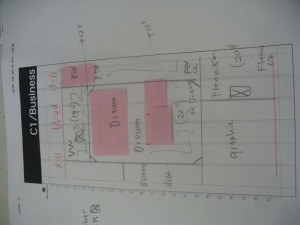 The first part is what he does most of his day, just because it takes so long. He first has to scroll through over 300 stories, and select about twenty for his division, the business section. He said that the number one thing that an editor needs to know is what stories are good and what stories are just fluff. When I asked him how he decides what stories make it into the paper, he said that the things he looks for is importance, interest, and controversy. Those are the things that people look for. Once he has decided on a story, he takes a sheet of scrap paper and draws a fake newspaper on it. Then, with the help of a ruler, a pencil, and various sizes of colored paper (which he uses to represent his photos), he designs his pseudo newspaper to his liking.
The first part is what he does most of his day, just because it takes so long. He first has to scroll through over 300 stories, and select about twenty for his division, the business section. He said that the number one thing that an editor needs to know is what stories are good and what stories are just fluff. When I asked him how he decides what stories make it into the paper, he said that the things he looks for is importance, interest, and controversy. Those are the things that people look for. Once he has decided on a story, he takes a sheet of scrap paper and draws a fake newspaper on it. Then, with the help of a ruler, a pencil, and various sizes of colored paper (which he uses to represent his photos), he designs his pseudo newspaper to his liking.
After he’s got it just the way he wants it, he decides on the photos that he will use. Because a lot of the stories in the newspaper are repeated, he sometimes uses the same photos over and over again. Sneaky? Not really. I mean, why waste a lot of time (and money) trying to get the perfect shot, when you’ve got five shots of approximately the same thing at your fingertips? But because they use similar shots, the Associated Press (AP) actually has a place on their website where someone like Mr. Tulis can visit and get pictures of anything he wants. It was to this particular website that he went, looking for a picture of the Wall Street stock exchange. He knew what he wanted, so he quickly ran through about half a dozen before finding the one that he felt was appropriate for the article. Interesting note: the Times Free Press doesn’t write their own columns. They pay four newspaper companies: Cox, McClatchy, AP, and the Times, for the use of their stories. And just from those four places, Mr. David receives almost four hundred possible stories, per day.
When Mr. David had decided on what stories to use, and what pictures to go with them, he then set about arranging them properly on his computer, which has a special program solely for that task. It’s a pretty complicated process, but basically, he has a newspaper page outline on the screen. He then draws little boxes with his cursor representing where the columns would go. Then, he moves the articles from their own little program to his, fits them in and divides them up as necessary, and by fitting and squeezing, crams all the stories together. The tough part is when he has to arrange it so that all the columns are on the exact same line, and they all even up to one another. However, he’s a professional at it, so he got it ready without too much trouble.
Finally, after a good four or five hours of working, Mr. Tulis completed the business section of the Wednesday paper. Success, right? Um, not exactly. The guy who was supposed to do the main section wasn’t there, so Mr. David had to put it together for him. Back to the old Acer monitor. This time, I was doing something to help out; I proof-read the other people’s papers. However, because of all the stuff in front of us, we couldn’t even take time off for supper. Apparently, even though Mr. David doesn’t have that big deadline each night, he still has to work like fury to finish all of his pages before midnight, which is printing time. We did get our food down though, although there was the time (insert editing joke here) when I started reading my granola bar wrapper and trying to unwrap the newspaper…
I found something out, though, while I was reading over the articles; different people notice different things. Take me, for example. I was seeing things no one else saw, but I was missing stuff that everybody else had caught. Mr. David saw my frustration at not catching everything and remarked, “you have the makings of an editor.” I told him, “how can that be? I’m missing a ton of stuff!” he immediately replied, “I didn’t say you are an editor, I said that you had the makings of one.” Now you talk about a great line.
Things were getting a little slow around this time, and David was just doing stuff that I had seen before, so I wandered around and finally ended up holding a bit of an interview with a guy named Chuck. Chuck is another copy editor (like Mr. David), and a really friendly guy. Here are some things that I learned about him– he originally earned a degree in broadcasting, and would sometimes broadcast the high school games in the area. However, for whatever reason, he ended up becoming a sports editor, and did that for ten years. He said that the job was fun, but nine months out of the year he would be working 50-60 hours a week, so he would be dead tired. When I asked what made him put in that many hours, he said that not only did he do his regular job, but he also had to answer the phone as well. Because a lot of the sports teams knew him, he would get all kinds of calls. Most of them would be the “hey, great column” kind, but he said that there was one time where a man threatened to beat him up because his son didn’t get his photo in the paper. Great for livening up a day when you’re bored, I guess.
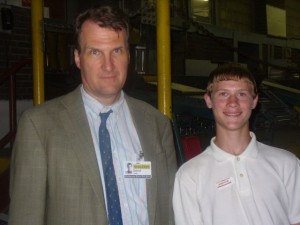 It was somewhere around eleven at this time, and Mr. David had finished all of his work for that day, so I got to ask him a few questions as well. We went into a private little meeting room, and talked. He started off by informing me that he has the exact same job, without a single promotion, that he had when he first started. He was born in the U.S., but grew up in Switzerland, and made some money by teaching English to women of the older generation. When he came back to America, his first thought was, “what can I do for a job?” He had an English degree, so it seemed like an appropriate line of work. Next, I asked what his view on what he should do as a Christian to promote the Gospel through the newspaper. he said that he feels like his job is to obliquely make sure that Christianity gets its say in things, and doesn’t get run down. I then asked him what his best and worst decisions over the course of his life have been. He said that his top wisest decisions have been marrying a Godly woman, being helped by good authors, and keeping his pride under control. For most unwise, he said that he couldn’t think of any. Lastly, I asked him how he made it through his teenage years. He said that his Christian upbringing, the simple fact that he read a lot, and his self-motivated learning skills were what got him through. We talked more than that, but I won’t write it down.
It was somewhere around eleven at this time, and Mr. David had finished all of his work for that day, so I got to ask him a few questions as well. We went into a private little meeting room, and talked. He started off by informing me that he has the exact same job, without a single promotion, that he had when he first started. He was born in the U.S., but grew up in Switzerland, and made some money by teaching English to women of the older generation. When he came back to America, his first thought was, “what can I do for a job?” He had an English degree, so it seemed like an appropriate line of work. Next, I asked what his view on what he should do as a Christian to promote the Gospel through the newspaper. he said that he feels like his job is to obliquely make sure that Christianity gets its say in things, and doesn’t get run down. I then asked him what his best and worst decisions over the course of his life have been. He said that his top wisest decisions have been marrying a Godly woman, being helped by good authors, and keeping his pride under control. For most unwise, he said that he couldn’t think of any. Lastly, I asked him how he made it through his teenage years. He said that his Christian upbringing, the simple fact that he read a lot, and his self-motivated learning skills were what got him through. We talked more than that, but I won’t write it down.
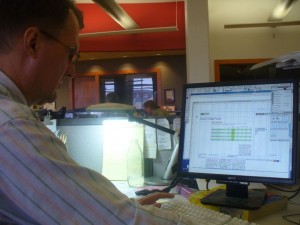 That conversation was the last thing I did there that night, because right then, dad showed up. I gathered all my things, shook hands with Mr. David, and left. I was dead tired, and my head hurt. But I had an absolute blast that day, and I could feel that I had learned a lot of important stuff as well. I hope that that’s the same feeling you get when you read this article, but even more so I hope that there aren’t any grammatical errors in it by the time that Mr. Tulis gets around to reading it.
That conversation was the last thing I did there that night, because right then, dad showed up. I gathered all my things, shook hands with Mr. David, and left. I was dead tired, and my head hurt. But I had an absolute blast that day, and I could feel that I had learned a lot of important stuff as well. I hope that that’s the same feeling you get when you read this article, but even more so I hope that there aren’t any grammatical errors in it by the time that Mr. Tulis gets around to reading it.